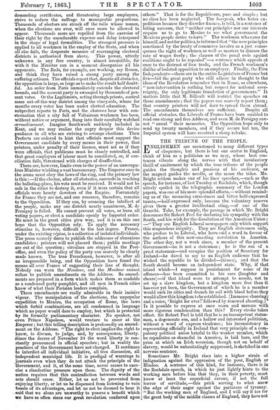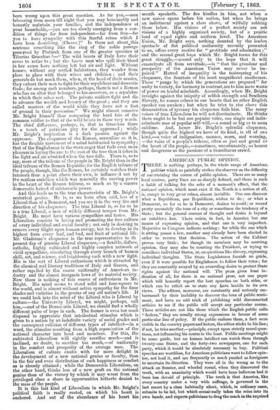THE TRIBUNE OF THE PEOPLE.
ENGLISHMEN are accustomed to many different types of eloquence, but there is but one orator in England, think of him as a politician as we may, whose best sen- tences vibrate along the nerves with that involuntary thrill of excitement by which the true tribune of the people guides the thoughts and passions of his audience, as the magnet guides the needle, or the moon the tides. Mr. Bright seldom makes one of his finer speeches,—such as the speech, for instance, of last Tuesday at Rochdale, which, though utterly spoiled in the telegraphic summary of the London papers, was one of his more splendid efforts,—without remind- ing us of the menacing earnestness and bitter half-expressed taunts,—half-expressed only, because the voluntary reserve gives them a greater intellectual sting,--of one of the Gracchi. Take, for example, the passage in which Mr. Bright denounces Sir Robert Peel for declaring his sympathy with the South, and his wish for the dissolution of the American Union : —" They are English Liberal newspapers only which support this stupendous iniquity. They are English statesmen only, who profess to be Liberal, who have said a word in favour of the authors of this now-enacting revolution in America. The other day, not a week since, a member of the present Government—he is not a statesman ; he is the son of a great statesman—and occupies the position of Secretary for Ireland—he dared to say to an English audience that he wished the republic to be divided—(hisses), and that the South should become an independent state. Why, if that island which—I suppose in punishment for some of its offences—has been committed to his care (laughter and cheers)—if that island were to attempt to secede, not to set up a slave kingdom, but a kingdom more free than it has ever yet been, the Government of which he is a member would sack its cities and drench its soil with blood before they would allow this kingdom to be established. (Immense cheering; and a voice, 'Bright for ever!' followed by renewed cheering.)" Is it possible to express at once scorn and menace with more vigorous condensation than this? Every stroke takes effect. Sir Robert Peel is told that he is an incompetent states- man, a degenerate son, and a hollow and interested politician, without a word of express virulence ; his inconsistency in representing officially in Ireland that very principle of a com- pulsory political union hateful to the weaker member, which he repudiates as shameful in America, is laid bare, and the price at which an Irish secession, though not on behalf of slavery, would be unhesitatingly suppressed, is sketched in one nervous sentence.
Sometimes Mr. Bright rises into a higher strain of indignation against the oppression of the poor, English or Hindoo. A sentence of this kind, for instance, there is in the Rochdale speech, in which he just lightly hints to the working men before him that they, in their poverty, must know at least the superficial savour, if not the full horror of servitude,—this prick serving to whet anew the edge of their anger against the partizans of tyranny. "But the working men of England, and I will say it too for the great body of the middle classes of England, they have not been wrong upon this great question. As for you,—men labouring from morn till night that you may honourably and honestly maintain your families, and the independence of your households,—you are too slowly emerging from a con- dition of things far from independent—far from free—for you to have sympathy with this fearful crime which I have been describing. (Cheers.)" Is there not about,,this sentence something like the ring of the noble passage preserved by Plutarch from one of the greater speeches of Tiberius Gracchus ?—" The wild beasts of Italy have their caves to retire to ; but the bravo men who spill their blood in her cause have nothing left but air and light. Without houses, without any settled habitations, they wander from place to place with their wives and children ; and their generals do but mock them, when, at the head of their armies, they exhort their men to fight for their sepulchres and domestic Gods ; for among such numbers, perhaps, there is not a Roman who has an altar that belonged to his ancestors, or a sepulchre in which their ashes rest. The private soldiers fight and die to advance the wealth and luxury of the great ; and they are called masters of the world while they have not a foot of ground in their possession." We might almost conceive Mr. Bright himself thus comparing the hard fate of the common soldier to that of the wild beasts in these very words. The chief difference, perhaps, is, that in Gracchus there is a touch of patrician pity for the oppressed ; while Mr. Bright's inspiration is a dark passion against the oppressor. The eloquence of the Roman, masculine as it is, has the flexible movement of a mind habituated to sympathy; that of the Englishman is the stern anger that feels even more pleasure in laying the axe to the root of the tree than it takes in the light and air admitted when the tree falls. There is, so to say, more of the tribune of the people in Mr. Bright than in the ideal tribune of the Roman Republic; for the English tribune of the people, though, like the Roman, he certainly watches their interests from a point above their own, is influenc-d not by the restless ambition NOlich was generally the moving power in the heart of the Roman tribune, so much as by a sincere democratic hatred of aristocratic power.
And this leads us to the true characteristic of Mr. Bright's oratorical genius. He is, as we have often said, less of a Liberal than of a Democrat, and you see it in the very fire and direction of his eloquence. The true Liberal is, so far as he is a true Liberal, a man of widely different temper from Mr. Bright. He must have various sympathies and tastes. His Liberalism consists in loving and promoting the free culture of every individual and social faculty ; not only in desiring to remove every blight upon human energy, but to develop in its highest form every leaf, and bud, and fruit of national life. Mr. Gladstone's eloquence is the true representative to th present day of genuine Liberal eloquence,—a flexible, diffuse, catholic, highly cultivated and highly complex network of vivid sympathies, circulating through every branch of human skill, art, and science, and brightening each with a new light. His is the sort of Liberal enthusiasm which is attracted by the classical and literary traditions of Italy and Greece, and rather repelled by the coarse uniformity of American in- dustry and the almost inorganic laws of its material society. Now there is nothing of this source of enthusiasm in Mr. Bright. His mind seems to stand solid and four-square to the world, and is almost without active sympathy for the finer shades and varieties in the genius of any old nation's life. If we could look into the mind of the Liberal who is Liberal by culture—the University Liberal, we might, perhaps, call him,—and of the Democratic Liberal, we should find a wholly different pulse of hope in each. The former is even too much disposed to appreciate that intellectual stimulus which is given to a nation by an indefinite variety of social grades and the consequent collision of different types of intellect—in a word, the stimulus resulting from a high organization of the national character into head and members. For this, the cultivated Liberalism will lightly sacrifice much—and is inclined, no doubt, to sacrifice too much,—of uniformity in the comfort and prosperity of the average man. The Liberalism of culture exults with far more delight in the development of a new national genius or faculty, than in the fair and even distribution of such happiness or comfort as is already attained ; while the Democratic Liberalism, on the other hand, thinks less of a new graft on the national genius than of the victory by which it may wrest from the privileged class a share in opportunities hitherto denied to the mass of the people. It is this last kind of Liberalism in which Mr. Bright's political faith is really rooted, on which his heart is anchored. And out of the abundance of his heart his mouth speaketh. The fire kindles in him, not When a new career opens before his nation, but when he brings an indictment against a class above, of wilfully robbing those below. His visions of a perfect society are not visions of a highly organized society, but of a prairie land of equal rights -and uniform level. The American Union, Mr. Bright says, nothing daunted by the leaden spectacle of flat political uniformity recently presented to us, offers every motive for " gratitude and admiration ;" and the second great hope which Mr. Bright forms for this great struggle,—second only to the hope that it will emancipate all from servitude,—is " that the grandeur and prosperity of the American Union may never be im- paired." Hatred of inequality is the mainspring of his eloquence, the fountain of his most magnificent anathemas.. Those " pangs by which the generations are prepared " for unity in variety, for harmony in contrast, are to him mere waste- of power on feudal mischiefs. Accordingly, when Mr. Bright inveighs against the iniquity of selfish strength and Southern. Slavery, he rouses echoes in our hearts that no other English speaker can awaken ; but when he tries to rise above this denunciation of tyranny his eloquence fails him. The many voices of true Liberalism he will not discriminate. He thinks there ought to be but one popular voice, one single and indis- criminate roar of popular self-will,—a sound so hie.° as to seem sublime. And, hence Mr. Bright's splendid eloquence, though quite the highest we have of its kind, is all of one kind,—a voice of indignation, menace, scorn, and warning, —the voice of a people's tribune, often as just and grand as the heart of the people,—sometimes, untortunately, as hoarse and dangerous as the passions of a tumultuous crowd.































 Previous page
Previous page